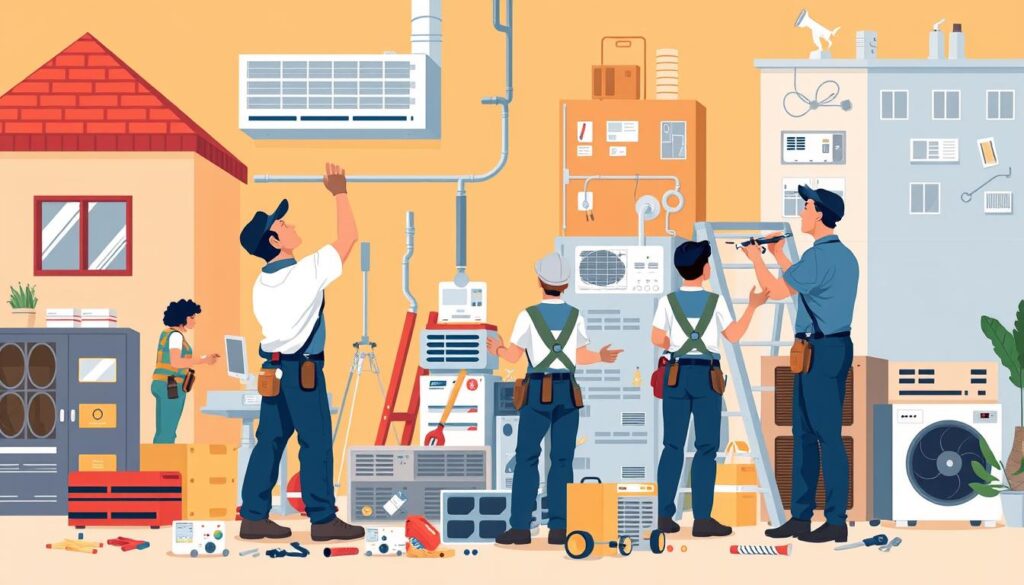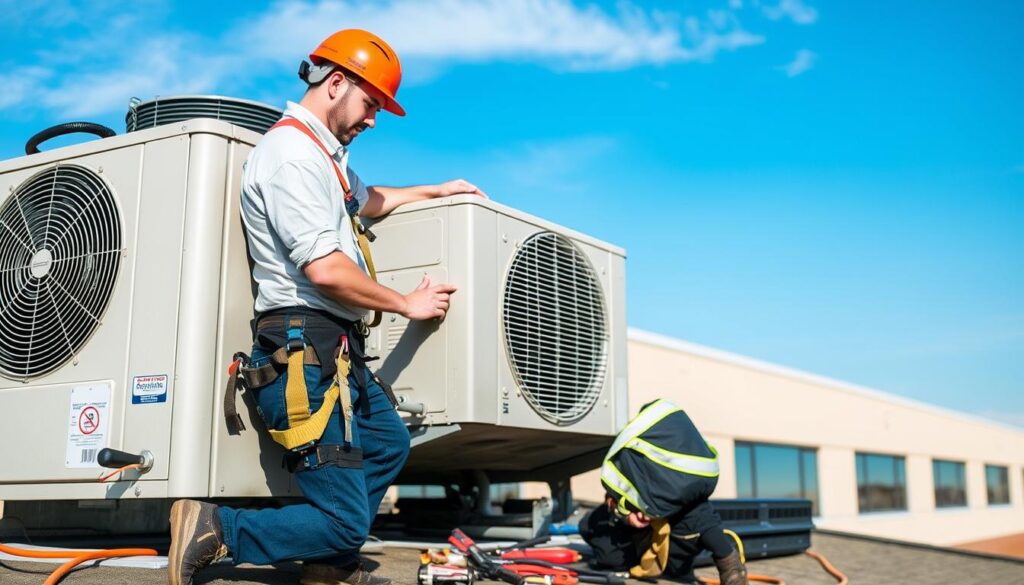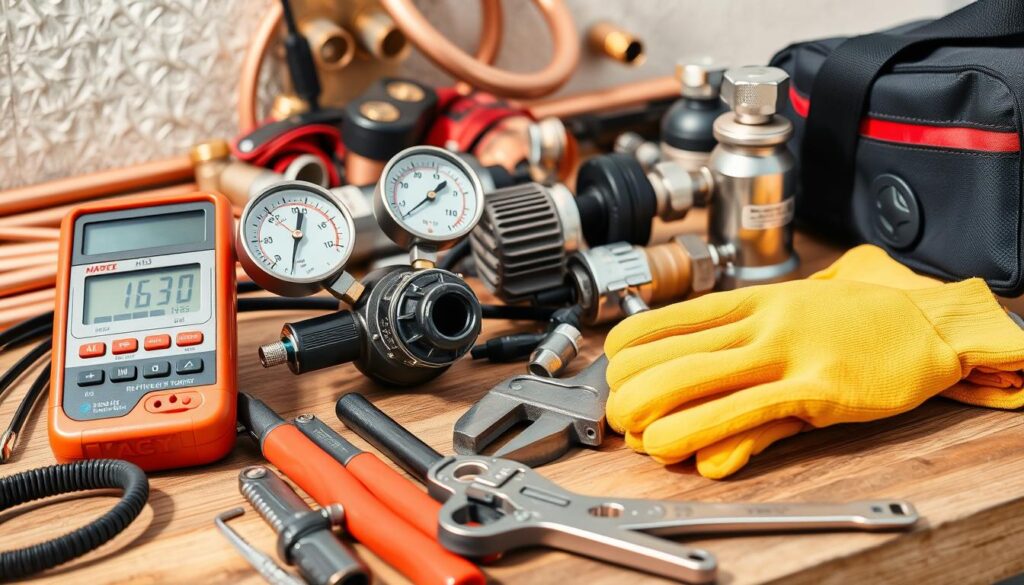Affiliate Disclosure
HVAC Guide Guys is a participant in the Amazon Services LLC Associates Program, an affiliate advertising program designed to provide a means for sites to earn advertising fees by advertising and linking to Amazon.
Can You Get Into HVAC Without School? “The secret of getting ahead is getting started.” – Mark Twain
The HVAC (Heating, Ventilation, and Air Conditioning) industry is a great choice for those looking for a fulfilling career. You don’t need a college degree to start. This field is known for its job security, good pay, and the chance to begin working quickly.
It’s perfect for anyone looking to change careers or for recent high school graduates. The HVAC industry is open to those who are eager to learn and gain the right skills.

Key Takeaways
- The HVAC industry provides job stability and growth potential, with a projected 15% increase in employment by 2026.
- HVAC technicians can earn competitive salaries, ranging from $31,000 to $123,000 per year, depending on experience and specialization.
- Alternative paths to HVAC careers, such as apprenticeships and on-the-job training, allow you to gain hands-on experience and earn while you learn.
- Certifications like the EPA 608 and NATE credentials are essential for HVAC technicians, regardless of formal education.
- Networking, job search resources, and building a strong resume can help you land entry-level HVAC positions without a degree.
Table of Contents
Understanding the HVAC Industry and Career Prospects
The HVAC (Heating, Ventilation, and Air Conditioning) industry is booming. It offers a stable job outlook and growth chances. In 2020, over 342,000 HVAC technicians were working, showing strong demand for skilled workers.
Current Industry Demand and Growth
HVAC technicians are key in installing, fixing, and keeping heating, cooling, and ventilation systems running. This includes work on furnaces, boilers, and air conditioners. The need for energy-saving and eco-friendly HVAC systems is growing fast. This means the industry is expected to grow by 15% by 2026, faster than most jobs.
Skills Required for Success
To do well as an HVAC technician, you need to be good at many things. This includes reading blueprints, using special tools, and making sure systems work right. You also need to know how to connect wires, test circuits, weld pipes, and find leaks. HVAC education programs teach all these skills, helping you apply what you learn in real situations.
Average Salary Expectations
HVAC technicians in the U.S. can make between $31,000 and $73,000 a year. With more experience, you can earn over $100,000. HVAC careers offer good pay and chances to grow professionally.
Explore Our HVAC Shop
Looking for top-rated HVAC tools, parts, and accessories? Visit our shop and find the perfect solution for your needs.
Visit the ShopBenefits and Challenges of Working in HVAC
The HVAC (Heating, Ventilation, and Air Conditioning) industry is both rewarding and challenging. As an HVAC technician, you’ll enjoy high demand, versatility, and ongoing learning. However, you’ll also face tough working conditions and irregular hours.
HVAC Career Advantages
- Strong job opportunities: The HVAC industry is expected to see a 15% increase in employment through 2026, according to the Bureau of Labor Statistics (BLS).
- Competitive salaries: The median salary for HVAC technicians as of May 2016 was $45,910, with the top 10% of earners making over $73,000.
- Varied skill development: HVAC technicians engage in creative problem-solving, addressing different system challenges daily, allowing for a diverse range of tasks.
- Job satisfaction: HVAC technicians can find fulfillment in making a tangible positive impact on their customers’ lives by ensuring the comfort and functionality of their homes or workplaces.
- Active work environment: Compared to sedentary desk jobs, the HVAC field provides an active work environment that can be beneficial for physical health.
HVAC Job Challenges
While the HVAC industry offers numerous advantages, it also presents some unique challenges that aspiring technicians should be aware of:
- Demanding working conditions: HVAC technicians may face physically demanding tasks, such as working in cramped spaces, dealing with heavy equipment, and exposure to extreme temperatures.
- Irregular work hours: HVAC technicians often work overtime during peak heating and cooling seasons, which can lead to irregular schedules and work-life balance challenges.
- Higher injury rates: The HVAC field has a higher incidence of on-the-job injuries compared to many other professions, requiring diligence and safety awareness.
Despite these challenges, the HVAC industry remains a dynamic and rewarding field. It offers promising career prospects for those willing to embrace the demands and take advantage of the opportunities it presents.
Explore Our HVAC Shop
Looking for top-rated HVAC tools, parts, and accessories? Visit our shop and find the perfect solution for your needs.
Visit the ShopCan You Get Into HVAC Without School?
While going to school for HVAC is helpful, it’s not the only way in. There are other paths for those wanting to start in HVAC without a traditional education.
Alternative Paths to Entry
An HVAC apprenticeship is a great option. You get to learn by doing and get real-world experience. Some companies even offer training on the job, so you can earn while you learn.
Another choice is HVAC certification through trade schools or vocational programs. These can be finished in about 6 months. This makes it a quicker way to start working in HVAC.
Required Certifications and Licenses
To work as an HVAC tech, you need certain certifications and licenses. The EPA 608 Universal CFC refrigerant handling license is a must for refrigerant handling. You might also need state-specific licenses, like electrical training or HVAC exams.
Learning Through Experience
Many HVAC techs started as maintenance workers. This way, they learned by doing and then focused on HVAC. The industry values learning and skills growth, offering training to its workers.
The HVAC field welcomes people without formal education if they have the right skills and attitude. With the right training, certifications, and a dedication to learning, you can succeed in HVAC without a traditional education.
Starting as an HVAC Apprentice
Starting as an HVAC apprentice is a great way to get into the HVAC industry. Apprenticeships let you earn while you learn. You get both on-the-job training and classroom lessons. These programs last 3-5 years, helping you learn essential skills and gain experience.
As an HVAC apprentice, you’ll do 144 hours of classwork and 2,000 hours of practical training each year. This mix prepares you for the HVAC field’s challenges. Big employers often help with apprenticeship costs, making it easier to start.
| Apprenticeship Duration | Annual Classroom Hours | Annual On-the-Job Hours |
|---|---|---|
| 3-5 years | 144 hours | 2,000 hours |
HVAC apprenticeships teach you a lot, from electrical systems to heating and ventilation. This wide range of knowledge is key for success. After finishing, you’re ready to move up in your HVAC career. You might get more certifications or even start your own business.
“Completing an HVAC apprenticeship is a fantastic way to gain the skills and experience needed to thrive in this dynamic field. It’s an investment in your future that can pay dividends for years to come.”
If you want a fulfilling career in HVAC, an apprenticeship is a smart choice. It combines practical training with classroom learning. This way, you’ll be ready for entry-level HVAC jobs and more.

Explore Our HVAC Shop
Looking for top-rated HVAC tools, parts, and accessories? Visit our shop and find the perfect solution for your needs.
Visit the ShopEssential Certifications for HVAC Technicians
If you’re thinking about a career in HVAC, getting the right certifications is key. HVAC techs are in high demand. The right certifications can boost your career and pay. Let’s look at the important certifications for success in this field.
EPA 608 Certification
The EPA 608 certification is a must for HVAC techs working with refrigerants. It comes in four types: Type I for small appliances, Type II for high-pressure, Type III for low-pressure, and Universal for all. This certification never expires, making it a valuable asset for your career.
NATE Certifications
Along with EPA 608, HVAC techs can get certifications from NATE (North American Technician Excellence). NATE offers certifications like Ready-to-Work and HVAC Support Technician. These show your skills and knowledge, making you more appealing to employers.
State-Specific Requirements
Some states require state-specific licenses or certifications for HVAC techs, especially if you plan to start your own business. Check the requirements in your state or where you plan to work to meet all qualifications.
Getting the right certifications is a big step in your HVAC career. It shows your expertise and dedication. This will help you have a fulfilling and successful career as an HVAC technician.
| Certification | Description | Cost |
|---|---|---|
| EPA 608 Certification | Federal requirement for handling refrigerants | $20 to $150 for proctored exam |
| NATE Certifications | Industry-recognized credentials demonstrating expertise | Varies by certification type |
| State-Specific Licenses | Additional requirements for HVAC technicians in specific states | $50 to $300 for 2-3 year license |
Getting the right HVAC certifications is crucial for your career success. Investing in your professional growth will prepare you for success in this sought-after field.
Building a Strong HVAC Resume Without Formal Education
If you want to start in the HVAC field without a degree, your resume is key. Focus on your mechanical skills, certifications, and any experience you have. This can be from jobs outside the HVAC field.
Highlight your problem-solving skills and attention to detail. Show any personal projects or volunteer work that show your mechanical skills. Also, talk about your eagerness to learn more, as the HVAC field changes often.
Include any HVAC certifications you have, like the EPA 608 or NATE Certifications. These show you’re serious about the field, even without a degree.
Don’t forget to mention any hands-on experience you’ve had. This could be from internships, apprenticeships, or DIY projects. Explain how these experiences have prepared you for HVAC work.
A good resume can lead to entry-level HVAC jobs. By focusing on your strengths, certifications, and experiences, you can show you’re a strong candidate. This is true even without a formal HVAC education.
“The HVAC industry is constantly evolving, and employers are open to hiring individuals with a strong mechanical aptitude and a willingness to learn, even without formal training.”
Explore Our HVAC Shop
Looking for top-rated HVAC tools, parts, and accessories? Visit our shop and find the perfect solution for your needs.
Visit the ShopFinding Entry-Level HVAC Positions
Starting your entry-level HVAC job search is an exciting step towards a rewarding career. You don’t need formal education in HVAC to get started. There are several strategies to help you find your first HVAC job.
Networking Strategies
Networking is key in the job search, especially in HVAC. Attend local HVAC events, join professional associations, and connect on LinkedIn. These connections can offer valuable insights, job leads, and mentorship.
Job Search Resources
- Use online job boards like Indeed, ZipRecruiter, and HVAC-specific job boards to find entry-level HVAC jobs.
- Check local classifieds and company websites for HVAC job openings in your area.
- Start in related fields like general maintenance or building services. This can help you gain experience for an HVAC role.
Your HVAC job search may take time and effort. But with the right strategy, you can find a great entry-level opportunity. This will kickstart your career in this in-demand field.
Tools and Equipment Needed to Start
Starting as an HVAC technician means you need the right tools and equipment. Some HVAC tools and beginner HVAC equipment might be given by your employer. But, it’s key to have your own tool kit for any job.
You’ll start with basic hand tools like screwdrivers, pliers, wrenches, and a utility knife. A good multimeter is also a must. It helps you find and fix electrical problems in HVAC systems.
- Multimeter
- Refrigerant gauges
- Pipe cutters
- Wrenches
- Screwdrivers
- Safety equipment (gloves, goggles, etc.)
You’ll also need specialized tools like a vacuum pump, refrigerant recovery machine, and tubing cutter. These tools are pricey but many employers help with the cost.
As you get more experience, you can add more tools to your kit. Think about getting a cordless drill, sheet metal shears, and digital probes for measuring pressure and temperature.
“Investing in quality tools is a wise decision for any HVAC technician, as they can make the job easier and more efficient.”
Always remember safety first when working on HVAC systems. Make sure you have the right safety gear, like safety glasses and gloves, to protect yourself.

With a solid tool kit and a focus on safety, you’re ready for any HVAC challenge. This will help you succeed in this growing field.
Explore Our HVAC Shop
Looking for top-rated HVAC tools, parts, and accessories? Visit our shop and find the perfect solution for your needs.
Visit the ShopCareer Advancement Opportunities in HVAC
The HVAC industry has many career paths for those who want to grow. Whether you’re new or looking to advance, there are many options. You can explore specializations or even start your own business.
Specialization Options
As you gain experience, you can specialize in areas like commercial refrigeration or solar panels. These specializations help you become an expert. They also lead to better jobs and more opportunities.
For example, those skilled in commercial refrigeration are in high demand. This is because these systems are key for businesses. Also, HVAC pros who focus on renewable energy are in a good spot. This is because of the growing need for sustainable solutions.
Business Ownership Potential
Starting your own HVAC business is another great option. You need technical skills, business knowledge, and connections. This path offers freedom, the chance to set your own hours, and higher earnings.
It usually takes 10 years of experience to start your own HVAC business. You’ll need to keep learning, stay current with trends, and build a network. With hard work and the right plan, starting your own business can be very rewarding.
The HVAC industry offers many ways to advance your career. You can choose specialized roles or start your own business. By always learning, developing key skills, and keeping up with trends, you can achieve long-term success in HVAC.
Tips for Success in the HVAC Field
Starting a HVAC career can be very rewarding. But, it also has its own set of challenges. To do well in the HVAC industry, keep these tips in mind:
- Embrace Continuous Learning: The HVAC field is always changing. New tech and rules come out all the time. Keep up with these changes to stay ahead.
- Develop Strong Problem-Solving Skills: HVAC systems can be tricky to fix. You need to think creatively to solve problems. Work on your ability to figure out and fix issues.
- Prioritize Excellent Customer Service: As an HVAC technician, you’ll talk to customers a lot. Learn to explain complex things simply. This will make sure your customers are happy.
- Prepare for Physical Demands: The HVAC profession is hard on your body. You’ll have to lift heavy stuff, work in tight spots, and deal with different places. Stay fit to do your job well.
Follow these tips to succeed in the HVAC field. You’ll build a fulfilling career that uses your skills and passion.
“Continuous learning and a problem-solving mindset are essential for thriving as an HVAC technician.”
Conclusion
Getting into the HVAC industry without college is possible. You can do it with hard work, a commitment to learning, and the right certifications. This path leads to a rewarding career with good pay, job security, and chances to grow.
The HVAC field is growing, with a 5% job increase expected by 2030. This means about 19,000 new jobs. It’s a great choice for those looking for a stable career.
Success in HVAC depends on learning the needed skills and getting the right certifications. You can use apprenticeships, on-the-job training, or a mix. With the right approach, you can have a fulfilling HVAC career without a college degree.

